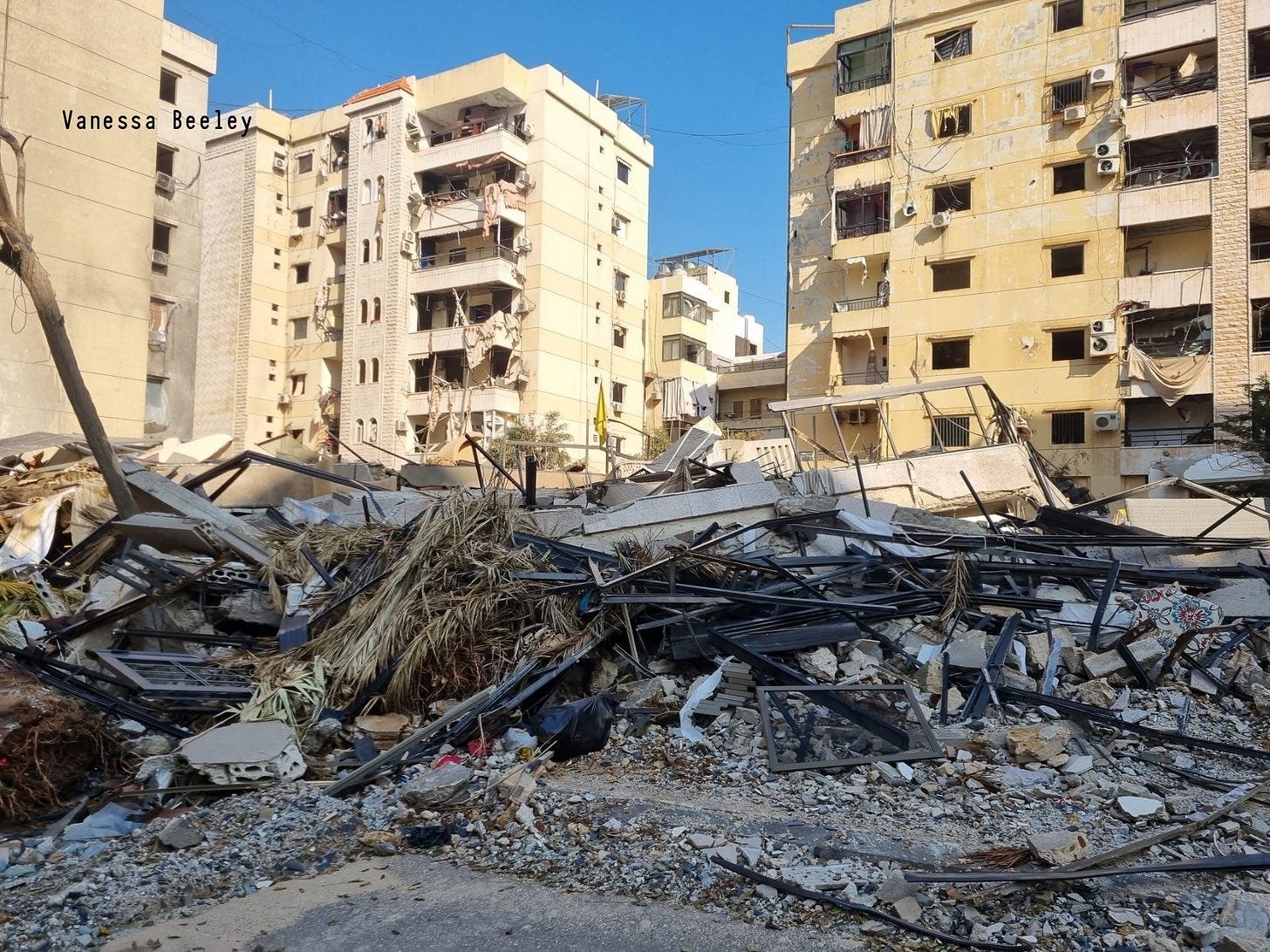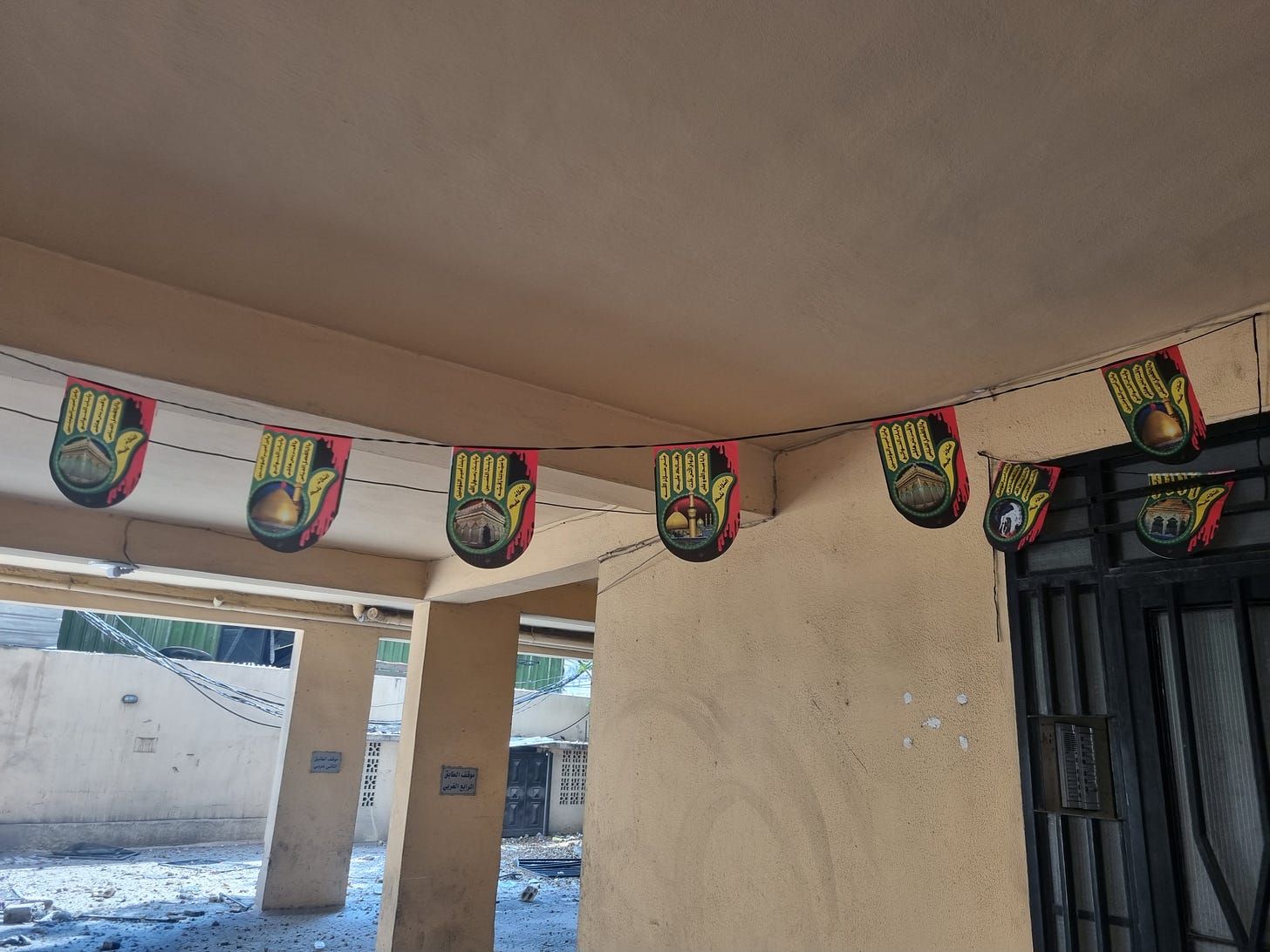The long road to Beirut now Israel has bombed Syrian borders
My recent trip to Beirut and Zionist-torn Dahyeh
The devastation in Dahyeh, southern Beirut. Photo: Vanessa Beeley
On Thursday 7th of November I set off for Beirut. I could no longer use the direct road through the Masnaa border with Lebanon. Israel has now bombed the road at least twice reducing the stretch between the Syrian and Lebanese border to rubble. The US influence (on behalf of Israel) in Lebanon has prohibited any attempts by the Lebanese or Syrian side to repair the road. Israel has threatened to bomb it again if either side tries to restore operations.
The blue dotted line is the usual route which is fast and efficient. The purple dotted line is the route now needed to reach Beirut from Damascus. Israel has also bombed several points and bridges on the Homs western route so it is necessary to head for Tartous further north on the coast and then turn south to reach the border.
From there is the very pretty coastal road to Beirut that passes through Tripoli and Batroun - where the Lebanese commercial shipping naval officer was kidnapped by IOF forces under the watch of the German Unifil ship. Germany has a foreign policy with regards to Israel that is fully complicit in the genocide that is being carried out against Palestinians and now in Lebanon.
Via Lebanese journalist Marwa Osman:
Lebanese citizen Imad Amhaz, who was abducted in Batroun by Israeli Forces, had been attending a month-long captain’s training course at a private maritime institute located in the area of Batroun.
Amhaz was reportedly staying alone in a rented apartment in Batroun. Israeli media claim Amhaz he may have ties to Hezbollah despite the fact that Amhaz is a civilian maritime captain of commercial vessels and is currently undergoing training at the private marine institution in Batroun.
Military sources revealed that the Israeli soldiers involved in the Batroun abduction numbered between 20 and 25, supported by additional escort personnel, with Lebanese army intelligence working to confirm the exact numbers.
According to the National News Agency, Batroun residents confirmed that the military force led Amhaz to the shore and swiftly departed with him on high-speed boats into the open sea.
The Amhaz family clarifies the identity of their kidnapped son by Zionist Israeli enemy forces in Batroun.
The father of Lebanese citizen Imad Fadel Amhaz, who was abducted in Batroun, wrote: “My son is a civilian maritime captain, currently attending a course at the Mersati Institute of Maritime Sciences in Batroun. This is not his first course there—he has taken several at the same institute since 2013. He usually works on civilian ships transporting either livestock or vehicles and spends most of his time at sea. He has no affiliation with any political parties and does not engage in politics. As for the reports circulating in the media about multiple SIM cards found with him, he purchases a SIM card in each country he reaches to stay in touch with his wife, children, and mother. He is a father of three.”
I stayed in a hotel close to where the Beirut port explosion occurred back in 2020. The blackened remains are still visible from the road into Beirut. This is known as a “hippy area” of the city where there is very little sign of the ravages of Zionist aggression. Only the drones, incessantly buzzing overhead, remind you that there is a resistance against occupation war going on.
This is one of the few areas where it is still possible to rent rooms, the one million displaced from the south have rented many of the available spaces in central and southern Beirut.
The people who were sleeping on the streets have gone. The local Lebanese NGOs have worked hard to find places to house them in the dry and out of the incoming winter cold and rain.
On Friday I went with friends to Dahyeh in southern Beirut, the area worst hit by the Zionist-US-manufactured bombs. We drove past the area where Sayyed Hassan Nasrallah was murdered by 85 1T bombs, the massive crater stretching down and across for what seemed an eternity.
As we entered Dahyeh residential area we drove through a Lebanese Army checkpoint. My friends were going to check on their house and to retrieve some of their belongings. We were told to wear masks, not to leave the car and not to open the windows because of the risk of DU contamination as reported by the Lebanon Council of Chemists Syndicate:
Depleted Uranium Bombs: Important Warning Statement Following the Aggression on Lebanon
The Council of the Chemists Syndicate in Lebanon condemned the "barbaric aggression against civilians in the country and the massacres committed against the Lebanese people."
Al-Majali indicated in a statement that his message today is "to condemn and raise awareness about the effects of inhaling the dust of the bombing that the southern suburbs of Beirut and the rest of the Lebanese regions are being subjected to. The extent of the destruction and the penetration of buildings and land for tens of meters is evidence of the use of bombs containing depleted uranium, which has tremendous penetrating power. The use of these types of internationally banned weapons, especially in the densely populated capital Beirut, leads to massive destruction, and their dust causes many diseases, especially when inhaled."
The Council of the Syndicate of Chemists hopes that citizens "do not approach the areas exposed to this aggression within a radius exceeding two kilometers. It hopes that those forced to approach these areas will commit to wearing protective clothing for dust and wearing masks for chemical materials."
As we drove through the battered suburb, people were sitting on the pavements drinking coffee and smoking sheisha oblivious to any such threats. We did ask a few people if they had suffered any ill-effects from the dust. Most said that yes, initially they had bad stomachs, nausea, diarrhea but after drinking milk the symptoms went away.
The scenes that greeted us were sobering. Especially for my friends who had not seen their neighbourhood for a few weeks - they were shocked and upset by the loss of homes and familiar landmarks that had been part of their daily life for decades. A ten storey apartment block had been completely demolished in the Zionist strikes:
We also visited Burj Barajneh suburb (not the camp) that is largely Palestinian. Again signs of bombardment were everywhere and Burj is often on the Zionist “evacuation” maps that are issued regularly to try to forcibly displace people from these districts. Many, especially older inhabitants, have refused to depart and face the nightly bombardment with a familiar stoicism.
Everywhere are billboard images of Nasrallah and Fouad Al Shukr the iconic Hezbollah commander that Israel assassinated before Nasrallah. I saw beautiful Golden Trumpet trees in full yellow bloom lining the streets of Dahyeh that were previously planted for Nasrallah, yellow to match the Hezbollah flags. Flashes of vibrant colour amidst the dust and bomb debris.
Shops were still open and people were moving freely. Drones were still circling overhead. The stubborn resistance against a terrorist illegitimate apartheid state that is failing in its ground invasion against relatively small numbers of highly trained Hezbollah guerillas who know the terrain so well - it is their homeland.
Our brief trip was uneventful. I couldn’t stay too long in Lebanon because there is no guarantee that Israel will not bomb the northern border or at least the roads from the Syrian border side - on the pretext that it is used to gun-run for Hezbollah.
Today (11th November) the Zionists bombed the vicinity of Hasiya industrial zone in Homs countryside. The aggression targeted Al-Majd suburb, south of Homs city. Fire brigades and ambulances were immediately dispatched. Local sources told me that the aggression had targeted a humanitarian aid convoy on the road in this area. Syrian Air Defences were deployed and continued responding for some time during the Zionist attack.
On the morning I left Beirut there had been a night of sustained and powerful attacks on Dahyeh. Drones still hovered above us in the early morning skies. Smoke plumed into the clouds in front of us. A generator fire had ignited in Hamra, city centre, and an entire car park was burning.
It took almost twelve hours to return to Damascus with delays on the coastal road in Lebanon, slow border processing because of the increase in daily traffic due to the closure of Masnaa. Trucks lined the narrow country road that leads to the constricted border and cars had to pass in one lane with little room to maneuver.
The day after I returned to Damascus, Israel attacked the south-eastern suburbs of Damascus - in Sayyeda Zainab a site of pilgrimage for many Iranians and Shia muslims.
A residential building was targeted killing up to nine civilians and injuring at least twenty. It is likely to have been another assassination attempt by the Zionists but until now there is no confirmation from the Syrian side.
The screams of a woman can be heard in the video. This is what Israel does - death and destruction on an industrial scale because the US alliance provide the bombs to make this possible.
Further updates soon.
****
Please do consider subscribing to my Substack. I am the only western journalist on the ground permanently in Syria and will be bringing you information that you will never find on the BBC. xx










Thank you for updating me on how my tax dollars are being spent. Maybe they are using my Social Security as well. One reason why Social Security is going bankrupt in a couple of years. I am glad you were still able to travel to Beirut. I can remember when Beirut was considered the Paris of the Middle East. I was a kid then.
I don’t know how you avoid MI6, Mossad, and the CIA, but you’re amazing. And one of the best sources of news for humanitarian minded people. Most journalists get bought out or compromised and are pressed to follow MSM narratives driving a fictitious reality.